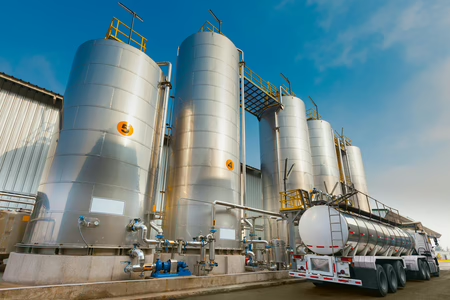
What Are the Different Types of Industrial Plants?
Everything from the plastic in water bottles to the fluorine in toothpaste is made in industrial plants. These factories are a critical part of the infrastructure of the United States.But they are also inherently dangerous.
Highly pressurized equipment, hazardous chemicals, and immense operational demands create daily risks for plant workers. And when management cuts corners or ignores safety protocols, the consequences can be catastrophic. Plant explosions don’t just devastate workers — they shatter families and destroy futures.
If you or a loved one has been injured in a plant accident, you deserve more than answers — you deserve justice.
Read on to learn about industrial plants, common causes of explosions, and how our undefeated plant and refinery explosion lawyers have won Billions for victims by holding the largest corporations in the world fully accountable. We’re ready to fight for your rights, protect your future, and ensure no company escapes responsibility for the harm they’ve caused.
Chemical Plants
These plants manufacture almost every type of chemical imaginable, which is what makes them dangerous. Many chemicals are hazardous when workers are exposed to them without protection. Any kind of leak or explosion can expose hundreds or even thousands of individuals within the surrounding area.
Workers aren’t the only ones at risk when a chemical plant explodes. Following an accidental explosion in San Jacinto County in 2023, the smoke from the fire spread noxious chemicals to nearby communities, putting residents at risk. This means that workers and residents could both potentially file a personal injury claim against the responsible party.
Oil Refineries
As their name suggests, oil refineries turn natural oil into substances that can be used in vehicles and home appliances.
In its natural state, oil isn’t particularly useful. Nonetheless, it can be dangerous. Unrefined oil is highly flammable. When something goes wrong, like it did at a BP America plant in 2005, the oil can become explosive.
Unfortunately, these sorts of explosions are often quite destructive. In the BP America incident, for example, 15 workers were killed, and another 180 were injured. The entire structure was devastated due to a single mistake.
Nuclear Power Plants
While Chernobyl and 3-Mile Island have repeatedly been the subjects of national news headlines, the meltdowns at these facilities were exceptions rather than the rule. Generally speaking, nuclear power plants have some of the strongest safety measures of any type of industrial facility.
The reason for this should be clear — nuclear power plants house some of the most dangerous materials on the planet. Even a minor radiation leak can cause lifelong suffering for a worker who is accidentally exposed.
More serious leaks can affect wide swaths of countryside, leading to radiation poisoning that can last for generations. Explosions, while practically unheard of, could potentially kill tens of thousands.
Metal Manufacturing Plants
Metal manufacturing plants are typically less dangerous than other types of plants when there’s an explosion. While there are some hazardous chemicals involved in the manufacturing process, the quantities are much lower than in the types of plants that have been previously discussed. The risk is, therefore, usually limited to the workers at the plant.
Heavy machinery and giant furnaces are often under significant pressure. An explosion can send large chunks of metal flying or release great pools of molten metal that are almost impossible for workers to get away from. Thankfully, explosions are less likely to chain to other areas, limiting the overall threat to employees.
Understanding the Different Types of Industrial Plants Can Help You Protect Your Rights
While industrial plant explosions are relatively uncommon — particularly when workers and employers follow government-mandated safety procedures — they occur far more frequently in Texas than anywhere else in the nation. Additionally, plant accidents involving chemical leaks, spills, and fires happen far more often than many people realize.
In fact, a chemical accident occurs every single day in the U.S., and Texas leads the nation in the number of chemical plant and oil refinery accidents. According to data from the Coalition to Prevent Chemical Disasters, the state witnessed at least 35 chemical incidents in 2024 alone.
If you’ve been hurt in an industrial explosion, though, the value of your injury claim may depend on the type of facility where it occurred. For this reason, knowing the differences between the various types of plants could benefit you when you’re pursuing a case.
Contact the Undefeated Plan & Refinery Explosion Lawyers: Call 1-888-603-3636 for a Free Consult
Our Undefeated Refinery Accident Lawyers have won Billions on behalf of workers throughout Texas, Louisiana, and across the United States injured and tragically killed in connection with the worst chemical accidents and plant explosions in history.
If you or a loved one were injured in a plant or refinery accident, call 1-888-603-3636 or Click Here to send us a confidential email via our “Contact Us” form.
We’ll answer your questions, explain your rights, and provide you with the information you need to decide what’s best for you and your family. All consultations are free, and because we work on a contingency fee, you won’t pay us anything until we win your case.
We proudly serve Harris County, Midland County, and throughout the state of Texas. We are located in Houston and Midland and throughout the state of Texas:
Zehl & Associates Injury & Accident Lawyers – Houston
2700 Post Oak Blvd #1000, Houston, TX 77056
(888) 603-3636
Open 24 hours

Zehl & Associates Injury & Accident Lawyers – Midland
306 W Wall St Suite 701, Midland, TX 79701
(432) 220-0000
Open 24 hours